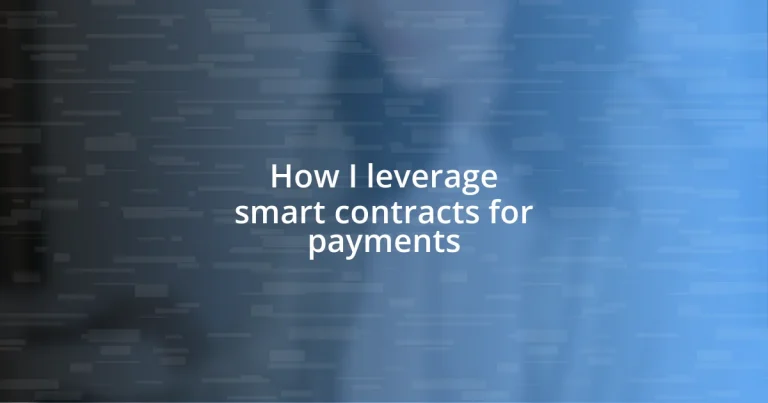Key takeaways:
- Smart contracts automate payment processes, providing speed, efficiency, and transparency, eliminating the need for intermediaries.
- Challenges in coding, legal enforceability, and scalability highlight the importance of careful implementation and understanding of smart contracts.
- Successful case studies in insurance, supply chain, and real estate demonstrate how smart contracts can enhance trust, reduce costs, and streamline transactions.
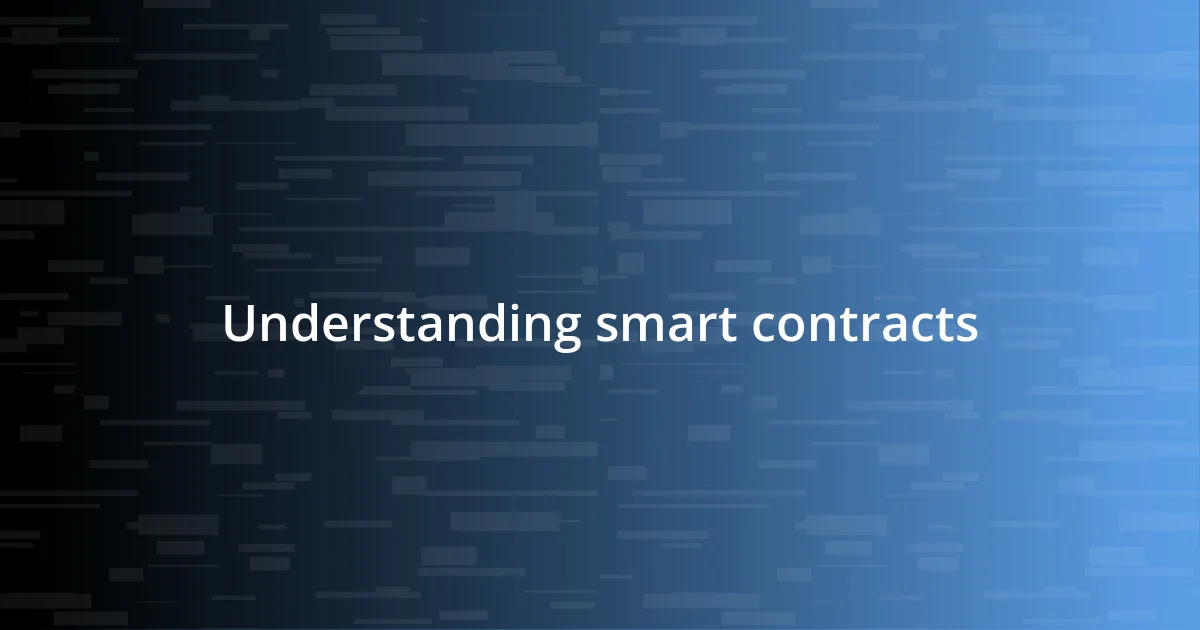
Understanding smart contracts
Smart contracts are essentially self-executing contracts with the agreement directly written into code. Imagine a vending machine that automatically releases a soda when you insert the right amount of money—it’s the same principle. I often find it fascinating how this technology can eliminate the need for intermediaries, providing a level of security and efficiency that traditional contracts simply can’t match.
When I first delved into smart contracts, I was struck by their potential to automate and streamline payment processes. Have you ever waited for days to receive payment, wishing for a more instantaneous solution? With smart contracts, the execution of payments occurs automatically once predefined conditions are met, allowing for quick and hassle-free transactions. It felt like unlocking a new level of convenience, and I knew then that this was a game changer in the world of finance.
Furthermore, the transparency of smart contracts truly resonates with me. Each action is recorded on the blockchain, creating an immutable history that can be viewed by all parties. This level of visibility builds trust—and I think we can all agree that trust is crucial in any business relationship. What’s more, I’ve experienced firsthand how this feature mitigates disputes; it’s reassuring to know that everyone involved is on the same page.
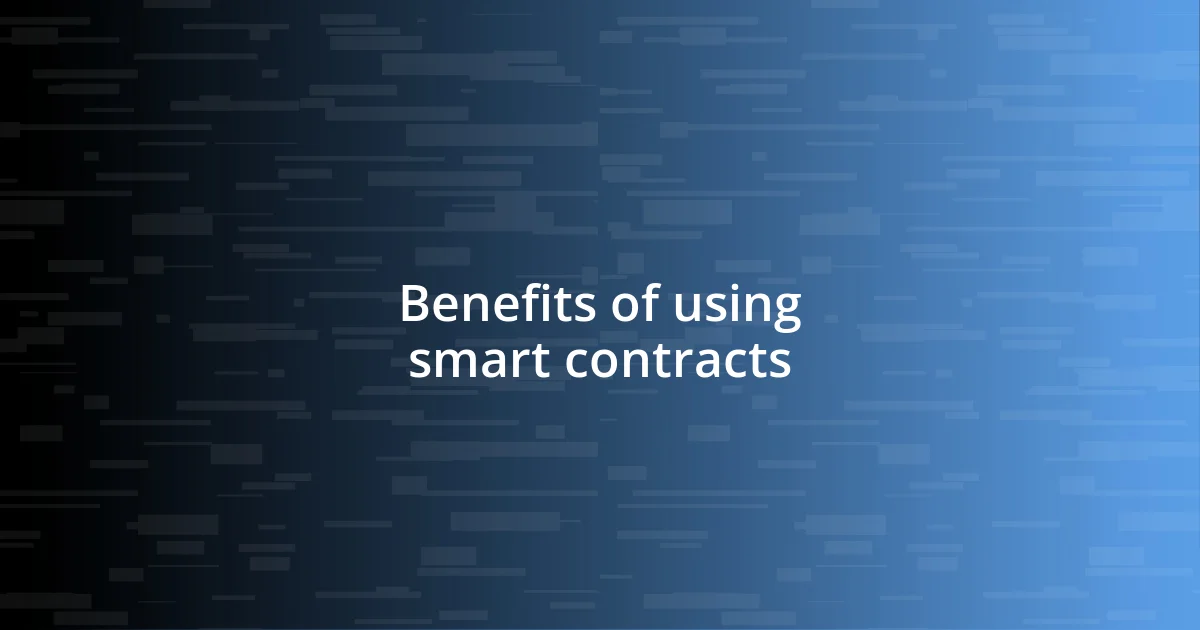
Benefits of using smart contracts
One of the standout benefits of using smart contracts is their ability to enhance efficiency. I remember a time when I was juggling multiple payments for a project, and the back-and-forth communication with clients felt endless. Smart contracts eliminate that hassle by executing transactions automatically once defined conditions are satisfied. It’s like having a reliable assistant who’s always on top of tasks.
- Speedy Transactions: Payments occur in real-time, reducing waiting times that can be frustrating.
- Reduced Costs: By cutting out intermediaries, I’ve seen significant savings on transaction fees.
- Error Reduction: Automated processes minimize human errors, which, believe me, are all too common in manual transactions.
- Trust and Security: With immutable records on the blockchain, I’ve found that trust is inherently built into every deal.
Additionally, the peace of mind that comes from using smart contracts is unparalleled. I recall a situation where a large payment was contingent on project milestones. Using a smart contract allowed me to focus on delivering quality work without worrying about whether I’d be paid on time. Knowing that the payment would be triggered automatically once the milestones were confirmed not only reduced my stress but also fostered a more collaborative environment with my clients.
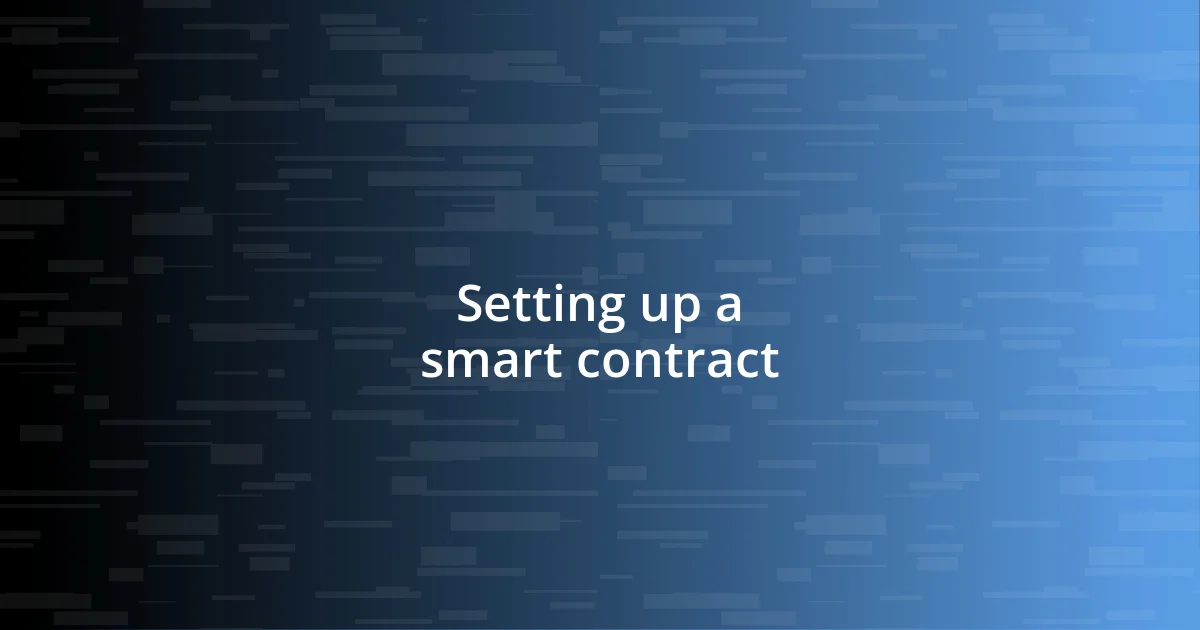
Setting up a smart contract
Setting up a smart contract might seem daunting at first, but I assure you it’s more straightforward than it appears. Personally, I was pleasantly surprised by how user-friendly some platforms are. When I first created my own contract, I utilized a step-by-step wizard that guided me through defining the key parameters. It’s like building a Lego structure—piece by piece, you assemble what you need, and suddenly, it becomes something functional and powerful.
Choosing the right blockchain platform is crucial. When I evaluated my options, I found that Ethereum offered robust tools for smart contract development. But my experience showed me it’s important to balance functionality with cost. I remember when I first tested my contract, the transaction fees on Ethereum were much higher than expected. This prompted me to explore alternative platforms like Binance Smart Chain, which, while also capable, offered much lower fees. It’s something I recommend considering as part of your setup process.
As I established my smart contract, I learned that testing is vital. I initially overlooked this step and ended up facing some unexpected issues. Utilizing test networks helped me refine my contract without the financial risks. Additionally, engaging in simulations granted me insight into how different scenarios could play out in real life. Let me tell you, nothing beats the sense of relief when you hit “deploy,” knowing you’ve taken the necessary precautions.
| Key Elements | Description |
|---|---|
| Platform | Select a suitable blockchain focusing on fees and capabilities |
| Parameters | Define the conditions and outputs of your contract clearly |
| Testing | Utilize a test network to mitigate risks before going live |
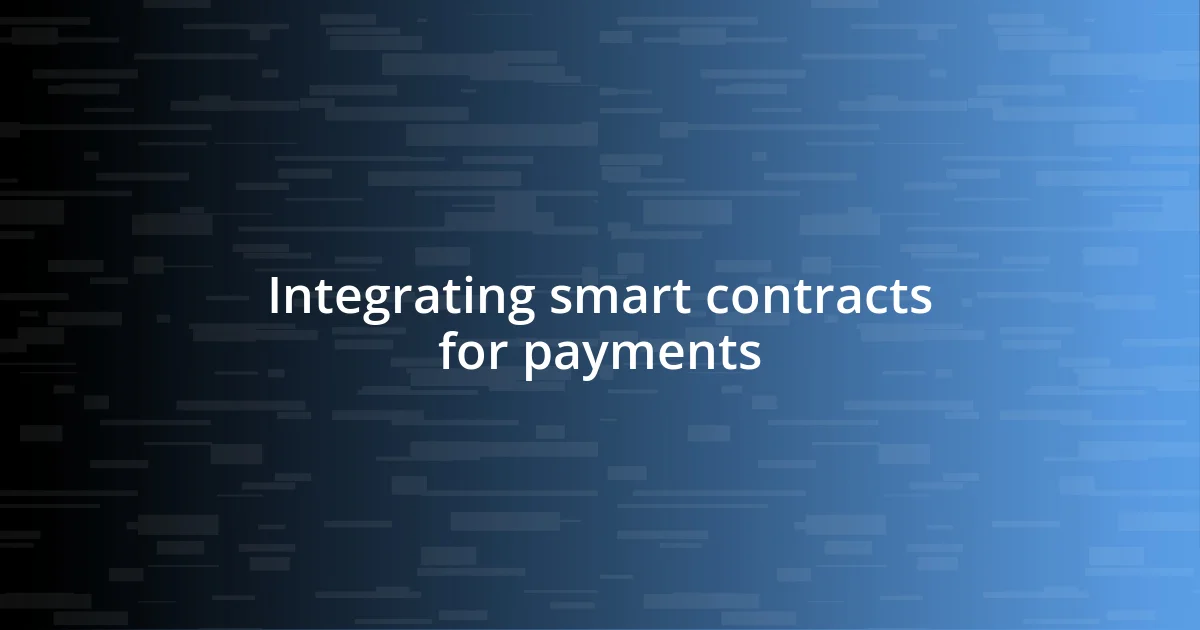
Integrating smart contracts for payments
Integrating smart contracts for payments has transformed the way I manage transactions. I vividly remember the first time I executed a payment through a smart contract. It felt like magic—one click, and suddenly the payment was on its way without any need for follow-ups or worries about delays. When conditions are black-and-white, you eliminate grey areas in business dealings, creating a smoother and stress-free experience for both parties.
As I started using smart contracts more frequently, I couldn’t help but notice how they facilitate trust. Imagine working on a project where reliability is key; knowing that funds are secured and will only be released upon meeting agreed milestones was a game-changer for me. I felt empowered, not only because I could focus on my work but also because it enhanced my client’s confidence in the process. Isn’t it reassuring to work with someone who knows exactly when and how transactions will take place?
Of course, integrating smart contracts requires a shift in mindset. Initially, I was skeptical and even a bit overwhelmed by the technology. What if something went wrong? However, after seeing the speed, efficiency, and accuracy firsthand, it was clear that the benefits far outweighed my concerns. Once I embraced this new approach, I felt like I had supercharged my payment process, allowing for more time and energy to invest in growing my business.

Best platforms for smart contracts
When I set out to find the best platforms for smart contracts, I was genuinely surprised by the variety available. Beyond Ethereum, which, as I mentioned, is robust but can be pricey, I looked into platforms like Solana and Avalanche. Both caught my eye because of their high transaction speeds and lower costs. I distinctly remember using Solana for the first time; the lightning-fast confirmations made me feel like I was living in the future. Have you ever experienced that moment when technology clicks into place? That’s how Solana felt for me.
Another platform I explored is Cardano, which emphasizes a research-driven approach to smart contracts. I found it intriguing how their emphasis on security and peer-reviewed protocols makes it a solid choice for more serious applications. It reminded me of a well-checking software situation I encountered when developing a contract back in the day. Just like having an extra set of eyes boost your confidence, Cardano’s structure reassured me that my contracts would stand on solid ground.
Lastly, there’s Tezos, which I couldn’t overlook. I was drawn to its unique self-amending feature, which enables the contract to evolve without needing to be completely rewritten. This made me think: how often do we wish our projects could adapt to changes seamlessly? I found the flexibility Tezos offered to be a huge advantage, especially for ongoing projects that may need adjustments down the line. In this fast-paced environment, having a platform that can adapt is not just a luxury; it’s a game-changer.
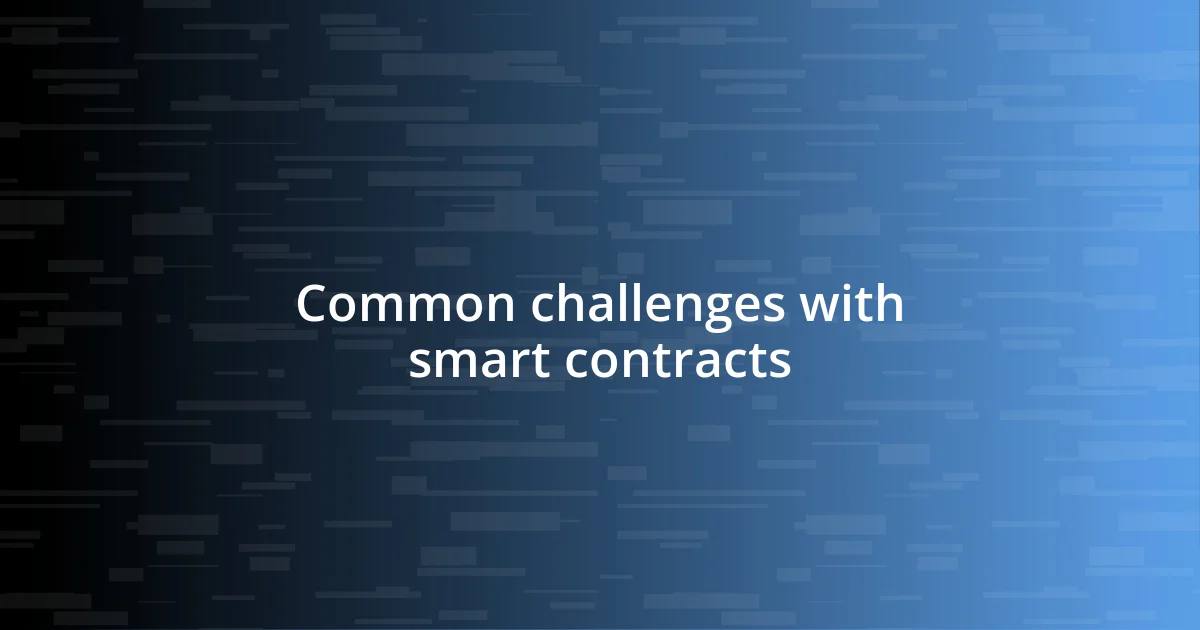
Common challenges with smart contracts
In my journey with smart contracts, I’ve encountered some persistent challenges that are hard to ignore. One of the most pressing issues is the complexity of coding these contracts. The first time I tried to write one myself, I felt like I was deciphering a foreign language. This experience taught me that even minor coding errors can lead to significant problems, typically resulting in lost funds or failed transactions. Isn’t it daunting to think that your entire business transaction could hinge on a single overlooked line of code?
Another hurdle I’ve faced is the lack of legal clarity surrounding smart contracts. As much as I appreciate the tech behind them, I often wonder how enforceable they are in traditional legal systems. When I first dived into this world, I had conversations with legal experts who pointed out that jurisdictional differences could make enforcing these contracts tricky. It made me realize that while technology is advancing rapidly, the legal framework hasn’t quite caught up, leaving businesses like mine in a gray area of uncertainty.
Lastly, there’s the issue of scalability that looms large. I still vividly remember the stress of a project where multiple transactions were supposed to occur simultaneously. The network congestion caused delays that made me question the reliability of the very system I had embraced. Can you imagine having to pause operations because the blockchain is overloaded? It was a wake-up call for me about the inherent limitations of current technologies, reminding me that, much like any tool, smart contracts have their boundaries.
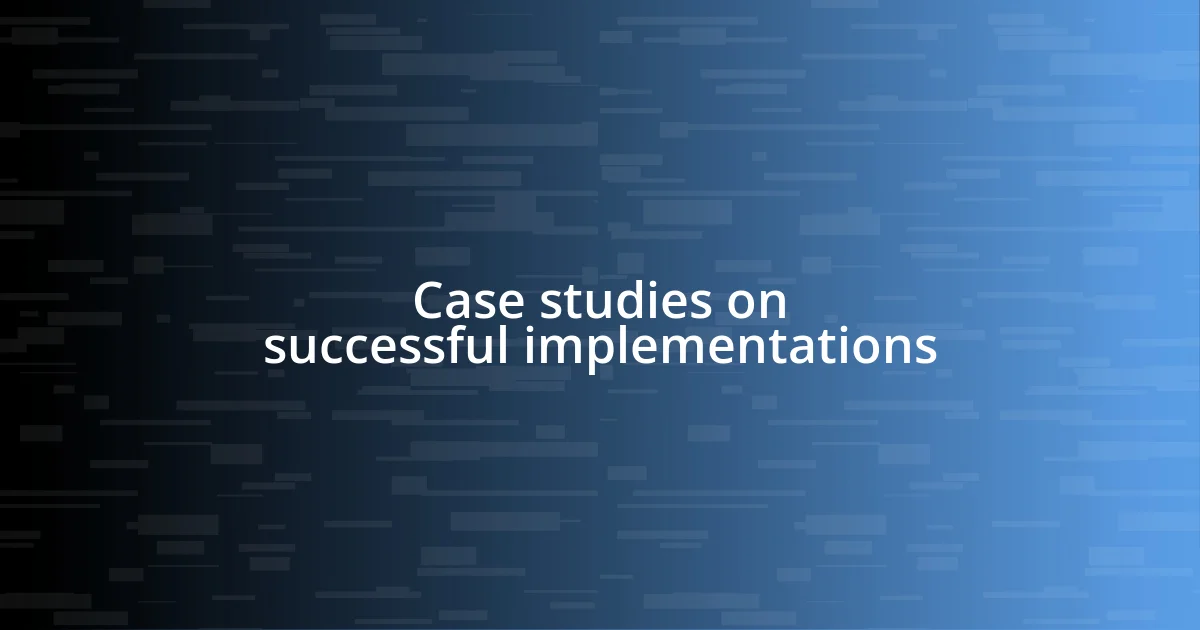
Case studies on successful implementations
In my experience, one of the most compelling case studies on smart contracts comes from the insurance industry. A startup I collaborated with leveraged smart contracts to automate claim processing. I remember the relief we felt when claims that previously took weeks to settle were resolved in just days. Wasn’t it fascinating to see technology speeding up processes that seemed bogged down by bureaucracy? The immediate feedback we received from clients was overwhelmingly positive, highlighting how smart contracts could enhance trust and transparency.
Another notable example that stands out to me is a supply chain company that integrated smart contracts to track the movement of goods. I had the chance to watch their transformation firsthand, as they reduced disputes over delivery times and conditions significantly. It made me think about all those times I dealt with vague contracts—wouldn’t it have been easier if every party had access to immutable data? This implementation led to a dramatic reduction in operational costs, making me realize how powerful visibility and accountability can be in business transactions.
Lastly, I’ve come across a real estate firm that utilized smart contracts for property transactions. The idea that we could eliminate escrow services and streamline payments excited me. I still remember a specific transaction where the buyer and seller completed everything in one seamless process, which used to take weeks. Can you imagine the thrill of transferring ownership with just a few clicks? This case illustrated to me the potential of smart contracts to revolutionize industries by minimizing friction in transactions.












